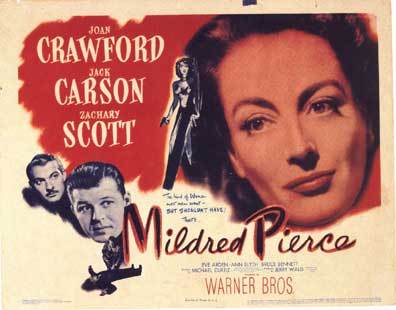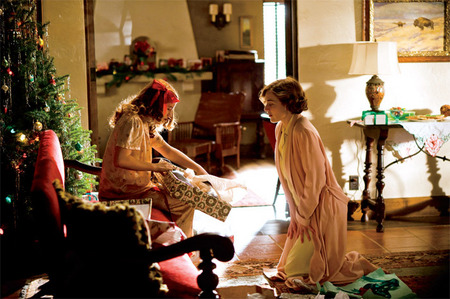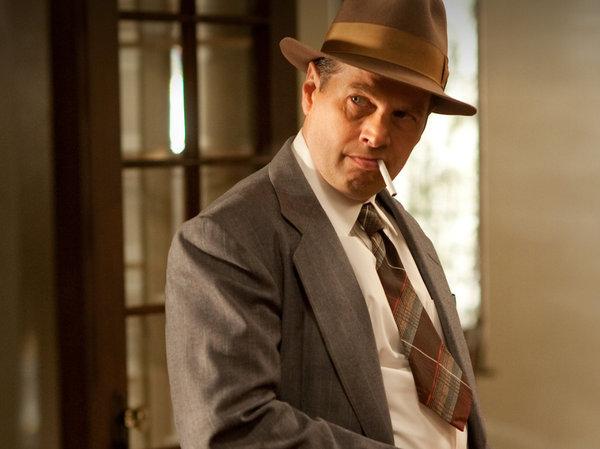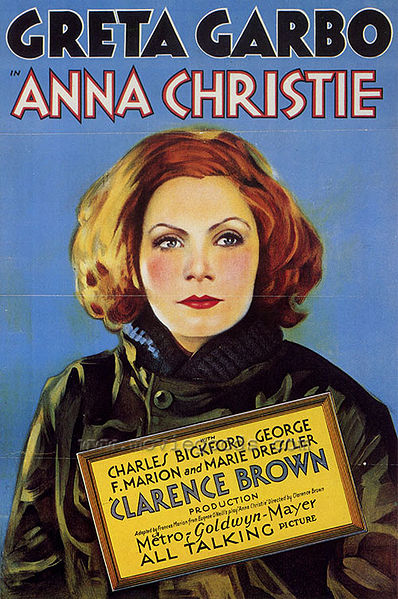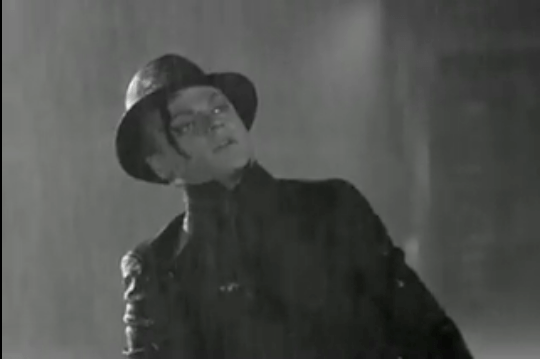Evan Rachel Wood
MILDRED PIERCE, PARTS 4 & 5: Glendale Sucks!
If you are one of the five people who has been keeping up with my Mildred Pierce recaps, please accept my sincerest apologies for the delay. The final two installments of Todd Hayne’s miniseries clocked in at 2 1/2 hours and I simply could not stay awake to watch the final half hour on Sunday night.

Parts 4 and 5 of Mildred Pierce are all about location: where characters live, where they want to live, and how where we’re from indelibly marks us. So it is fitting that Part 4 opens with a establishing shot of the ocean. Seagulls alight on the beach and then fly away again. We soon find out that this is Laguna Beach (before it was Laguna Beach). Mildred (Kate Winslet) and Lucy (Melissa Leo) have come here to check out a new location for her restaurant. From their conversation we discover that Mildred has already opened a second restaurant in Beverly Hills and that the Laguna location would be her third. Mildred plans to serve her signature chicken and waffles dinners, the dinners that have served her so well, but Lucy has a different idea. Lucy explains that when people are vacationing at the beach they want “a shore dinner”: fish, crab, lobster and maybe a steak. Mildred balks at the idea but Lucy is insistent. When the restaurant opens later in the episode, Mildred is surprised to see that her wealthy patrons want to eat outside on the patio. Moments like these reveal the divide between Mildred, hard-working but always working class, and the upper class clientele she serves. She might be serving them food and taking their money, but she will never truly understand them. The distance between Glendale and Pasadena is too great.
Veda, who is now 17-years-old and played with haughty perfection by Evan Rachel Wood, is all too aware of this distance. When her piano teacher dies suddenly, she must seek out a new one. Of course, Veda being Veda decides that she can only work with the best, a snooty Italian conductor, Carlo Treviso (Ronald Guttman). Halfway through Veda’s audition he gently closes the piano cover, as she is still playing, which is a total dick move. She flees the audition, sobbing (as she did in Part 3), and Mildred attempts to comfort her daughter, but her encouraging words enrage Veda, “You think I’m hot stuff, don’t you?” she spits, “Well I’m not, there’s one like me in every Glendale!” Veda’s point is that she is a big fish in a little pond, just like her mother. And if her mother were more cultured, more high-class, then she would realize how average and ordinary her daughter’s talents are. In other words, Mildred’s love and admiration for her daughter mean nothing to Veda because of who Mildred is: she is Glendale. And Glendale is filled with middle brow people with middle brow tastes, people who don’t know the first thing about “real” piano playing talent or the necessity of wearing tight turtlenecks. Did you know, by the way, that Veda hates Glendale?
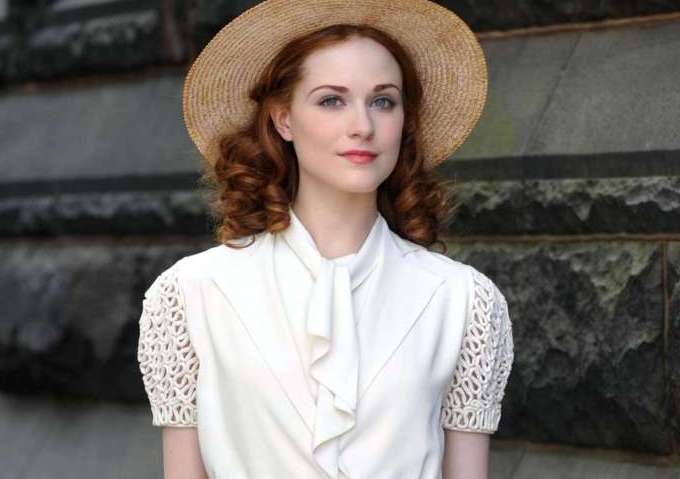
Veda hates the ordinariness of Glendale/Mildred because she fears (or possibly knows), that deep down, she might be Glendale too. Mildred’s success in the restaurant and pie business is the result of hard work, sacrifice, intelligence, and perseverance, all qualities that Mildred values. However, it is precisely these qualities that Veda hates. Because anyone can work hard. Anyone can persevere. But only a few special people are born with true class and true talent. Veda desperately wants to be one of those special people and hates her mother for not bestowing this specialness on her at birth. This becomes painfully clear during my second favorite scene of the miniseries. Mildred has just discovered Veda’s plans to blackmail the son of a Hollywood director and she questions why her daughter would need this money, “I’ve never denied you anything, anything money could buy I’ve given you.” Veda replies:
“With enough money I can get away from you and your pie wagons and your chickens and everything that smells of grease. I can get away from Glendale and its dollar days and its furniture factories. Women who wear uniforms and men who wear smocks. From every rotten, stinking thing that reminds me of this place or you!”
Oh man, what a speech! Where to begin? First, Veda borrows Monty’s (Guy Pearce) words when she refers to Mildred’s “pie wagons,” the chain of restaurants that have created the life of privilege Veda now enjoys (and resents). She is a young Monty in the making. Veda also elaborates on what she hates so much about Glendale: people work in Glendale. There are furniture factories and department stores with … gasp … dollar days! Obviously, Veda would never buy anything on sale. But what is most interesting about this speech is Veda’s anger over “women who wear uniforms and men who wear smocks.” Veda clings to old-fashioned notions about gender. Specifically, she resents that her mother has taken on the role of breadwinner in her home, that her mother emasculated her father, and that Mildred takes “what she needs” from the men around her.
So Mildred kicks Veda out, Mildred is sad, and we get lots of sad, long takes of Mildred alone in Glendale, staring longingly at photographs of her two departed daughters. And what has Veda been doing all of this time? Apparently, Veda is a magnificent singer, a rare singer known as a coloratura soprano. She is so magnificent that mean old Treviso begged her to be his student. I am willing to buy that Veda is suddenly this amazing singer. But I do find it odd that, with all of her training and exposure to music instructors, Veda has only discovered this rare talent at the age of 18?
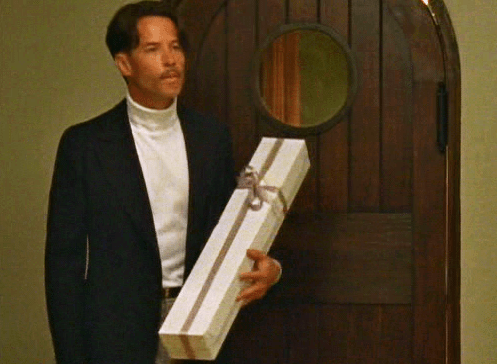
After so many months apart, Mildred is desperate to win Veda back. She runs into Monty (Guy Pearce), her old flame, and she makes the impulsive decision to purchase his withering estate. Monty even adjusts the price to account for all the money he borrowed from her years ago. What a great guy! He also gives her some oral sex, which she clearly appreciates, but then Mildred has to ruin all that sex and purchasing of expensive real estate by deciding that she and Monty should get married. Really Mildred? Really? Monty agrees, but only because he senses that to say no would mean that the real estate deal would fall through. And damn it, tight turtlenecks don’t come cheap!

Did I mention that this final segment of the miniseries was 2 1/2 hours long? That is a lot of melodrama! So let’s summarize quickly, shall we? Mildred and Monty get married. Veda shows up at the wedding reception and agrees to move back in with Mommy, now that Mommy is living in Pasadena in a sweet mansion. Mildred gazes longingly at Veda while she sleeps as if she can’t believe that her baby is home again. Veda gets to sing at the Philharmonic. Monty is spending all of Mildred’s money on fancy liquor, jodhpurs, and turtlenecks. Mildred is falling behind on payments and her creditors are pissed. Wally, for some reason, has turned on Mildred (WTF Wally?). Burt (Brian F. O’Byrne) and Mildred decide that they need to borrow money from Veda to save the business and Burt tells Mildred that she’s got to ask Veda for the money now, in the middle of the night!

So Mildred rushes home to look for Veda and can’t find her. She heads to Monty’s quarters (apparently Monty and Mildred no longer sleep together) and guess who’s in bed with Daddy? Yep, it’s Veda! [My favorite scene of the whole miniseries] This revelation is not a surprise for those familiar with the novel or the 1945 film, but Evan Rachel Wood manages to make it shocking by her sheer defiance. As Monty attempts to put the blame on Mildred (he claims that Mildred used him as “bait” to lure Veda home), Veda simply reclines in bed, smoking a cigarette with those blood-red nails of hers. Then, to drive home the point that she really hates her mother, Veda gets out of bed, stark naked, and walks slowly over to the vanity. This is a real “fuck you” walk. It says “I’m young, I’m skinny, I’m beautiful, and I just stole your man. Suck it, Mommy.” She then begins to slowly brush her hair, eyeing her mother through the vanity mirror. Monty approaches and puts a robe around Veda’s shoulders, which is the final straw for Mildred. She lunges at her daughter, knocking her to the ground, and begins to strangle her. She only stops when Monty pries her hands from her daughter’s throat. Then, in a moment of perfect melodrama, Veda dashes down the steps to the piano, and tries to sing. All that comes out is a hoarse moan. Veda collapses on the very expensive Oriental rug, gasping and crying.

When we next see our characters, it is a few months (weeks?) later. Mildred and Burt have just returned from Reno, where Mildred got a divorce and then remarried her ex-husband. Because, of course. They decide to move back into the Glendale house, which will, in the 1990s, become the home of the Walsh family of Minnesota. Veda shows up to wish her parents well. Her voice is nearly healed and she’s headed to New York City (at last, no more Glendale!). Apparently, her old sponsors, Pleasant Cigarette, dropped her after her mother strangled her, which conveniently freed Veda up for a far more lucrative contract with Consolidated Foods. So what we are supposed to understand is that Veda was hoping her mother would attack her? That being caught in flagrante delicto was the only way for her to get out of her old contract? I find it all to be very far-fetched. but it’s enough for Mildred to finally decide that she is done with Veda. Weeping over Veda for the last time, Mildred retreats to the original pie wagon, where Burt urges, “To hell with her.” Mildred agrees, “All right, Burt, to hell with her.” Then they decide to get “stinko,” which is an old-timey word for getting shit-faced drunk.
Overall, I found this ending to be very unsatisfying. I understand that the HBO version is a faithful retelling of James M. Cain’s novel. However, I much prefer the ending to the original Mildred Pierce (1945, Michael Curtiz), in which Veda murders Monty because he refuses to marry her, and Mildred attempts to take the blame. No matter what Veda did, and no matter how angry Mildred became, she never gave up on her daughter. And maybe this Mildred hasn’t given up either. Maybe getting drunk and declaring “To hell with her!” is the only way Mildred can deal with her daughter’s betrayal.
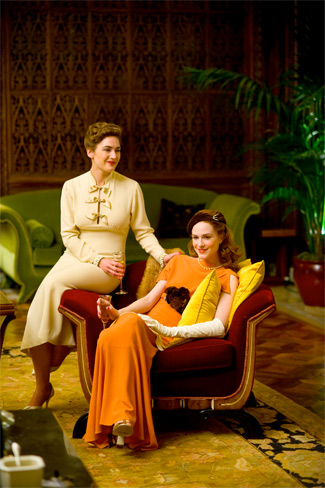
So, for those managed to read through this very, very long recap, what did you think? Did you enjoy this miniseries? Was it worth 5 1/2 hours of your life?
Evan Rachel Wood Ain’t MY Vampire Queen
Like many True Blood fans I was anxiously awaiting the arrival of Sophie-Anne (Evan Rachel Wood), vampire queen of Louisiana, whose existence had been leaked through various entertainment news sources weeks ago. Last week I was tantalized by the sight of her lavish home and the image of a pale female foot, bathed in a stream of blood. And as a fan of Wood, whose portrayal of a teenage terror in Thirteen (2003, Catherine Hardwicke) blew me away, I was sure that the young actress was well-equipped to handle the role of an 1100-year-old vampire queen.
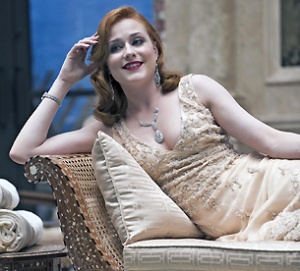
But last night I found myself underwhelmed. I don’t blame Queen Sophie-Anne’s failure on the writers–who gave her choice lines like “I haven’t been interested in men since Eisenhower was President”–or the costume designers–who gave her beautiful white gowns and bathing suits to luxuriate in (plus a vintage copy of Vogue to read!). No, this character fell flat due to Wood’s lackluster performance (though EW’s Ken Tucker disagrees with me).
Queen Sophie-Anne is supposed to be more than 1,000 years old, but Wood plays her like a precocious child playing dress up. Such a role is certainly challenging–Wood needs to convey the sense that she is an old soul even as she lives in a teenager’s body, a state of endless arrested development. But it has been done before and done well. Here I can’t help but think of Kirsten Dunst’s turn as Claudia, a mature, blood-thristy vampire trapped in the body of a sweet, prepubescent girl for all of eternity, in Interview with a Vampire (1994, Neil Jordan).
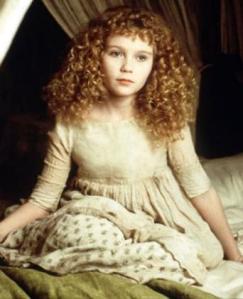
I believed Dunst’s performance–indeed, I found it to be highly disturbing. Dunst expressed her frustration with her small, child’s body and its incompatibility with her adult hungers. You could see her age in her eyes and in the way she carried her body. Queen Sophie-Anne is supposed to be elegant, regal and a commanding presence (she is the QUEEN after all) but as Wood plays her she is more like an annoying celebutante in the vein of a Paris Hilton or a Lydia Hearst. Blech.

I am not giving up on Evan Rachel Wood (girlfriend did look hot), but for now I remain unimpressed.
P.S. Not enough Eric (Alexander Skarsgard) in last night’s episode. Just sayin’.
I’m Thinking More MEAT!: Some Thoughts on True Blood, Episode 10
True Blood seems to get better with every episode that airs. When it premiered last fall I was unimpressed and was close to giving it up. My new Southern friends here in North Carolina assured me that Sookie Stackhouse’s (Anna Paquin) accent was laughable (what did I know?) and the series’ vampire plot seemed like Buffy-lite. But slowly the show found its footing. And now I’m obsessed.

I attribute much of the show’s allure to its mastery of the slow burn. What I mean is this: while many programs with rich, soapy plots (The O.C., Desperate Housewives, Gossip Girl)) rush through their storylines, anxious to bring them to a climax before audience interest wanes, True Blood is a true tease. Mysteries remain mysterious and flirtations go on and on and on (I am particulary taken by the brewing attraction between Sookie and Eric [Alexander Skarsgard]). Furthermore, we are always finding out something new about the show’s characters–they evolve and become more complex with each episode.
Maryann Forrester’s (Michelle Forbes) story arc is another great example of True Blood‘s deft storytelling technique and character development. Maryann first appeared at the scene of Tara’s car accident at the end of Season 1, cradling a pig and looking devious. The writers made us suspicious of her character then, but buried her secrets behind Maryann’s sweet, disarming demeanor. In this way we were much like Tara (Rutina Wesley); we know something isn’t right about Maryann, but what is it? That she smokes too much weed, buys too much delicious fruit, and parties too hard for a woman in her 40s?

It is not until almost halfway through Season 2 that we find out that Maryann is an immortal supernatural being and somehow tied to the god, Bacchus. She thrives on unfettered human drives like hunger, lust and violence. The scene in last night’s episode (“New World in My View”), where Maryann crafts a pyre of meat and flowers while the sounds of buzzing flies fill the air was the apotheosis of the excess she had been slowly and cannily directing all season long. It was a satisfying moment.
The best scene of the evening, however, had to be when Jason Stackhouse (Ryan Kwanten) (who really deserves an Emmy for his work this season) and Andy Bellefleur (Chris Bauer) (who will always be Frank Sobotka to me) outwit Maryann’s angry mob by outfitting Jason as the “God who comes.” These two characters are consistently portrayed as the biggest morons in the town of Bon Temps, but they are able to (momentarily) save Sam Merlotte’s (Sam Trammell) life by using their wits. So there’s something else rattling around in Jason’s brain besides the drive to drink beer, screw and kick ass? Good to know.
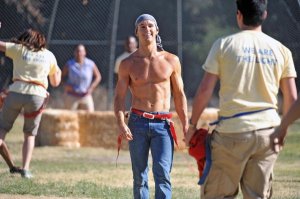
An honorable mention goes to Lafayette Reynolds (Nelson Ellis) (any scene with Lafayette is a great scene as far as I’m concerned), who banded together with his estranged aunt (Adina Porter) to yank Tara free from Maryann’s spell. At one point Lettie Mae prays for her daughter’s salvation but trails off in despair and, without missing a beat, Lafayette finishes her prayer. Lettie Mae turns, looking surprised. “Jesus and I agree to see other people. That doesn’t mean we don’t talk from time to time” he responds in his usual deadpan manner. So Lafayette has religion? Yet another nuance we can add to his already rich character.

And of course I would be remiss if I didn’t mention “the Queen” (Evan Rachel Wood), who Bill (Stephen Moyer) visits just before the episode ends. We see only her white leg, covered in a stream of blood, before the screen fades to black. As always, True Blood, like any good tease, leaves me wanting more.


